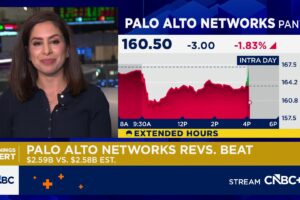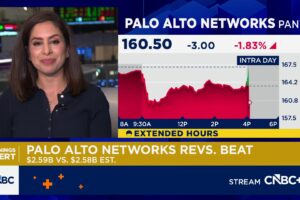
Bloomberg
Citi, BofA Want to Save Traders’ Time With Fixed-Income Platform
(Bloomberg) — If Citigroup Inc. and Bank of America Corp. have their way, CLO traders are about to become a lot more productive.In the market for collateralized loan obligations, traders still spend the majority of their time helping clients manually compile bid lists for auctions known as “bid wanted in competition,” or BWICs. It’s a slow process, and there’s usually little revenue generated by the effort.“It’s very time-consuming,” Vitaliy Kozak, a managing director at Citigroup who oversees the firm’s secondary CLO trading business globally, said in an interview. “I started at Citi 12 years ago as an analyst on the CLO secondary desk, and the market was trading very similar to how it trades today.”So Citigroup and rival Bank of America are setting out to build a new platform for executing fixed-income trades, focusing their initial efforts on the CLO market. The new venue, which is being tested by both banks, will ultimately be a central place for trading desks to see data for structured credit and other underlying collateral markets, the companies said in a statement Monday. They’re planning to launch within a year and hope the effort will lead to more participation in the market.“It’s bold, ambitious, but overdue,” David Trepanier, head of structured products, global credit at Bank of America, said in an interview. “We’re really excited and expecting the industry to embrace this. It will change how the industry engages in this market.”Since the last financial crisis, issuance of CLOs — bundles of loans made to junk-rated companies that get packaged into bonds — has soared. The banks’ new platform comes as many of the biggest CLO players — including Japan’s Norinchukin Bank, Wells Fargo & Co. and Fidelity Investments — are returning to the $900 billion market after spending much of last year on the sidelines.Stock markets were the first to embrace electronic trading because equities are standardized and trade frequently. Some currency and bond markets have since followed suit, but not without push-back from traders who argued that their transactions were driven by relationships and that the products were too complex to be handled by computers.Despite that resistance, the transition, known in the industry as electronification, has continued as investors seek out advanced platforms to cut costs and provide data-crunching tools that give them a clearer view into markets. Now the push is making its way deeper into fixed-income markets.Even with increasing electronification, CLO traders still spend as much as 60% of their time manually compiling bid lists for the bid-wanted-in-competition auctions. But those efforts contribute to a small portion of the revenue they ultimately generate. With the new platform, Citigroup and Bank of America believe they can cut that time down by as much as 80%.“Technology has not really kept up with the increasing size” of the CLO and leveraged-loan markets, said Alex Naboicheck, head of U.S. leveraged-loan trading at Bank of America. With an electronic venue, “you don’t know you need it until you have it.”Project OctopusThe new platform doesn’t yet have an official name, though the internal code name for the effort is Project Octopus.Citigroup, for its part, is backing the effort through its spread products investment technologies group, or SPRINT, which makes investments in financial technology for the firm’s trading arm. Almost two years ago, SPRINT helped Citigroup introduce a new application for BWIC auctions. Since then, the lender has seen a more than 25% increase in the volume of trades it handles on the auctions.“As time went by, we realized that the platform had peaked as a single-dealer platform since it can’t really change market-structure dynamics,” Kozak said. “That’s when we decided we needed to go out and invite other dealers.”The new platform will use Citigroup’s existing technology, meaning much of the work ahead will focus on connecting the venue to other dealers and clients. In 2016, BofA launched Instinct Loans, an electronic platform for secondary trading of syndicated corporate loans.“Between us and Bank of America, we have enough scale to make this something that is interesting and impactful on Day One,” Matt Zhang, head of the SPRINT group and Citigroup’s global co-head of structured products trading and solutions. “That’s why a lot of other dealers may like to join us.”Data CostsWall Street’s biggest banks and hedge funds have grown vocal in recent years about the rising costs that third-parties charge for trading and market data. Sell-side firms spend about $140 million a year on such data, according to consultancy Greenwich Associates.Costs aside, banks are sitting on a mountain of unstructured data tied to their sprawling CLO businesses, with no way to use much of it. Part of the aim with the new exchange is to allow banks to use more of that data, a move that should lead to lower costs, said Katya Chupryna, project lead in SPRINT.“This is still a market that doesn’t have pre- or post-trade data capture,” Chupryna said. “What we’re creating is something that everybody on the sell side as well as the buy side will say that they need and want.”For more articles like this, please visit us at bloomberg.comSubscribe now to stay ahead with the most trusted business news source.©2021 Bloomberg L.P.








